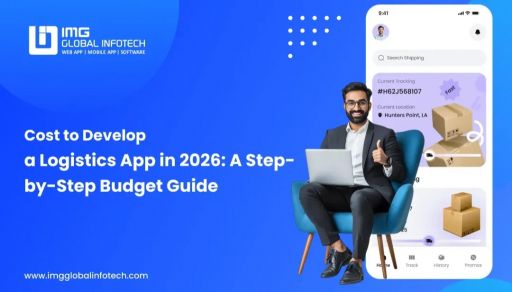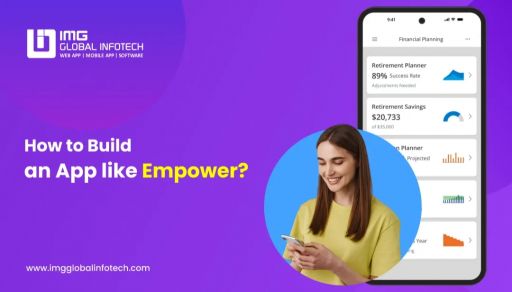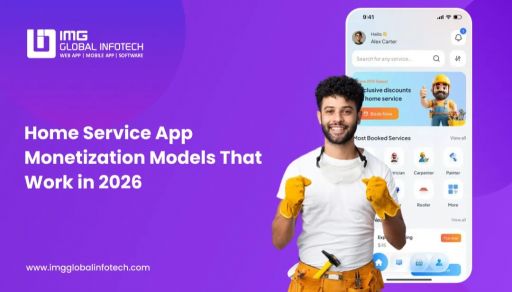Exploring The Role Of AI In Mobile App Development: Key Benefits & Use Cases
Lokesh Saini
Nov 05, 2025

There is great influence of AI technologies everywhere now because they are accessible and reduce the human workload. We know that AI can also doing mistakes but we can't deny that AI technologies are a kind of backbone in tech sectors, especially in mobile app development. The development process of an app was complex before the integration of AI. But after the introduction of Artificial Intelligence in Mobile App Development, every process became seamless in the development procedure. Whether it is creating unique features or allocating resources that can also cater to all your business needs.
We have various concepts of AI in mobile app development in different ways. Through this blog, we just want to share the major Role of AI in Mobile App Development (key benefits & use cases). We will also discuss several other topics in this blog but first let's understand the concept of AI in mobile app development as well.
What is Artificial Intelligence in Mobile App Development?
Before considering the effect of AI on mobile applications, let's define AI and the way it works in the context of mobile app development. Artificial Intelligence refers to the ability of machines to think like humans, enabling them to solve problems, make decisions, learn, and recognize speech. AI can be divided into three major categories:
-
Artificial Narrow Intelligence: Task-specific AI performing one particular task exceptionally well. Examples include Siri and Google Assistant.
-
Artificial General Intelligence: AI that has the capability of performing any intellectual task that a human being is capable of; it is, however, still theoretical.
-
Artificial Superintelligence: A level of AI that is beyond human intelligence and has not yet been achieved.
Most AI in App Development belongs to the category of Artificial Narrow Intelligence. This form of AI can significantly enhance mobile apps by allowing them to understand and learn the needs of users over time, thus providing personalized experiences more intuitively.
The Growing Role of AI in Mobile App Development
As per the report of Grand View Research, the global AI apps market size was estimated at $2940.0 million in 2024 and is projected to reach $26,362.4 million by 2030 with a CAGR of 38.7% from 2026 to 2030.
Key Market Trends & Insights:
-
By end-use, BFSI is going to register significant CAGR growth over the forecast period.
-
North America accounted for a significant share in the market and held a 29.48% share in 2024.
-
By functionality, the Natural language processing (NLP) segment led the market and accounted for 31.5% of the global revenue in 2024.
Key Benefits of Using AI in Mobile App Development
With the increasing use of AI in mobile app development, mobile apps are becoming better and more sophisticated in Benefits of AI in App Development. AI-powered smartphone apps that let users do amazing things like voice assistance, face editing, language learning, and more are in high demand right now.
Popular AI-based smartphone apps that provide users with a plethora of cutting-edge features include Google Assistant, Amazon Alexa, Replika, FaceApp, ELSA, SnapChat, Socratic, Duolingo, and Lensa.
Behaviour Patterns of Users
Understanding user behavior plays a very decisive role for businesses to set up an appropriate marketing strategy in Impact of AI on Mobile App Development. A mobile app is unable to provide any useful data analytics unless it is capable of learning the behavioral patterns of users. But AI mobile app development can capture the behavioral patterns of its users with full accuracy.
It combines different ML algorithms with NLP, enabling it to monitor activities done by users within the application. With it, the owners of applications can get an overview of their customers or users and provide personalization.
Informal UI
It is one of the top advantages one gets with the use of AI in mobile app development. Modern users love those mobile apps that are interactive in nature. Many AI apps, such as Duolingo, Google Assistant, Alexa, and many others, have conversational UI features, which offer a human-like experience in conversation from AI app development company USA. This feature empowers mobile apps to easily and effectively engage users and thus offer an interactive user experience.
Many companies and enterprises use AI-based conversational UI in chatbots to provide better online customer service, and interestingly, AI chatbots have been able to help companies improve their service enormously.
Automated Reasoning
Conventional mobile applications require the efforts of coding and programming in huge amounts to build complex in-app functionalities in the Role of Artificial Intelligence in Mobile Applications. Additionally, developers generally need to rely on different tools & SDKs when it comes to integrating intelligent or advanced-scale reasoning abilities in mobile applications. But AI in mobile app development allows developers to create smart, automated reasoning.
Predictive Intelligence
One of the top abilities of AI & ML is predictive analytics. It allows mobile applications to intelligently collect data about users and provide personalized or customized offers to them that How to integrate AI in mobile apps. By embedding AI in app development, mobile apps get enhanced ability to observe customer behavior patterns closely and offer them things in which they are most interested. This thus helps mobile apps engage users and thereby improves the conversion rate.
High-End Security Data
Security and user privacy are the major concerns in today's digital age. With growing consumer adoption, the task of securing user data through mobile apps is a great challenge in AI and Mobile App Development. There are many data regulations and laws that the mobile apps have to comply with. Artificial intelligence here helps mobile apps by ensuring high-end security features.
Top Use Cases of AI in Mobile Applications
From digital assistants to personalization and chatbots, there are various kinds of use cases of AI in mobile apps. AI has a different concept of conducting the operations in day-to-day business activities from the perspective of AI use cases in app development. Here are a few cases of AI-driven mobile application development as well.
Digital Assistants
We have seen many digital assistants like Google (Google Assistant), Microsoft (Cortana), Apple (Siri), and Amazon (Alexa). These are some real-life examples of digital assistants. It can leverage the voice recognition technology by integrating NLP (Natural Language Processing) technology of AI Integration in Mobile Apps. These digital assistants can identify the user's voice and their intent to convert it into a command as well.
Predictive Analytics
It is good to maintain things in present but you also prepare for the future needs and demands in your business. As you also know, this thing that the demands of customers are not constant every time.
But the main thing is how to analyze this thing? Well, thanks to the predictive analytics features from the AI-driven system. This feature can examine the users' previous data and provide insights that can predict the future needs in your business as well.
Chatbots
Lily from Duolingo, Ora from SEPHORA, and Kuki AI are all great examples of AI-powered chatbots used in mobile applications. They automate messaging systems that offer 24/7 personalized chat solutions without requiring human involvement into How AI is Changing Mobile App Development. They frequently respond to user inquiries, quickly resolving them. Natural language processing, or NLP, enables AI-powered chatbots to comprehend user requests with ease and react accordingly.
Personalization
AI-driven mobile apps have this feature to track the customer's behavior and preferences. With this feature you will get real-time information through insights and you can provide them personalized solutions for particular needs of AI for Mobile App Developers. For example, Shopify apps can provide personalized solutions in this case. It can analyze sales data that can also forecast trends, which is very helpful for future moves in your business as well.
Object Detection
Will your future mobile app make image searching a priority? If so, then you need to use object recognition technology enabled by artificial intelligence (AI). Object detection in a mobile app identifies objects, locations, people, and other similar relevant things with AI technology through AI mobile app development services USA. Google Lens, Pinterest Lens, Amazon Shopping, and Snapchat are examples of AI object detection in a mobile app.
Google Lens uses a phone camera to identify text, objects, and landmarks to give a person information about translating text or items, identifying animals and plants, and much more.
Real-World Examples of AI in Mobile Apps
Recently we have seen benefits and use cases of AI in mobile apps to maintain a clear understanding. At this point let's talk about the real-life examples of AI in mobile applications that can further clarify this topic as well.
Duolingo
Many e-learning businesses use AI within their applications that can also personalize suggestions. For instance, Duolingo can offer learning languages that aims to provide the effective learning routes that can match their needs in a creative way. However, the app can adapt to examine the individual strengths and weaknesses that can enhance the learning experience in the language.
Snapchat
Snapchat is an impressive social media platform with useful and attractive filtering. It has discovered the unique way to blend AI technologies with Augmented Realtiy among with standard functional features. These kinds of filters use AI algorithms that can recognize faces and integrate the engaging elements. Snapchat AR filters that can increase the customer engagement. It can also attract sponsorship and partnership to build innovative ads, which can convert Snapchat into an income-streaming source.
Spotify
Spotify is a well-known music streaming app. It can also leverage AI that can create personalized playlists and suggestions for the users. Spotify algorithms can analyze the listeners' preferences, which are based on genres as well. The level of personalization businesses have achieved with AI technology has increased engagement. There is a higher rate of subscription to generate higher revenue in your business.
Starbucks
Starbucks integrates AI technology into its mobile app that can monitor user activities from the app. The app uses AI which helps to clarify the customer needs and preferences that can suggest the personalized beverages and food items as well. Starbucks is well known for its unique marketing strategy that includes promotion and rewards, which is mainly based on customers' ordering habits. This can enhance the customer satisfaction level and loyalty in their business as well.
Uber
Yeah, we can't forget Uber in this list, although it is one of the biggest ride-hailing The uber app uses AI and predictive analysis that can enhance the user experience with operational efficiency. Uber can easily analyze the demand patterns that can enable a strategic placement for drivers that can reduce the waiting time for passengers.
The AI technology can also provide a dynamic pricing process, which is based on various demands, especially in the peak times. It can also manage the precise predictions that not only improve customer satisfaction but also increase the overall effectiveness of your business as well.
How AI is Transforming Mobile App Development Process
Integration of AI with mobile applications requires a change in operations management because regular applications are not intelligent enough to handle such operations under AI features for mobile apps. Therefore, it is very crucial to look at the process from a different perspective since mobile application development involves dealing with a lot of data. Let's understand its key steps:
Defining Objectives and AI Requirements
First of all, one needs to define which process or feature the introduction of AI will most benefit. Your objective should be how this implementation of AI will improve the completion time of the process in question. Then, with the analysis in mind, data from the field is gathered.
Data Collection and Model Training
Now you know what type of data you want to collect based on the parts where you want to implement AI. Hire mobile app developers that can handle these kinds of operations seamlessly. It's very important at the initial phase of the data fetching process to define your sources of data collection. Further, you refine and clean it so that accurate and duplicate-free data is fed to the AI module.
App Design and AI Feature Integration
The data that will be fed into the module will define the way the app should interact with other features and users. The understanding of whether you need more APIs and how many of them would be useful is the third step. You would also need more data modeling to make your app fully fledged and intelligent.
Testing and Performance Optimization
Testing of the performance of the AI model starts with an understanding of how this implementation will benefit your business and users. The model should be optimized for performance in such a way that it upgrades the user experience and attracts people's attention.
Deployment and Continuous Improvements
The final step is to deploy the app, but even after deployment, it requires continuous learning and optimization of models for bettering accuracy, updating, and scaling. This means using user feedback, real-time data, and performance analytics to train AI models from the latest data by fine-tuning the algorithms.
Future Trends of AI in Mobile App Development (2026 & Beyond)
AI always surprises us with its magical technologies that work like magic spells on any operation as well. AI technologies are adaptive, and they can also reshape the landscape of your business for the Future of AI in App Development. Predictive analysis, hyper-personalization, and self-learning are ongoing technologies that we will see in 2026. So, let's talk about upcoming trends of AI in mobile app development as well.
Machine Learning Algorithms for App Personalization
With Generative AI in mobile application development, the future is set to enable applications that can dynamically generate UI elements and responses. ML models analyze real-time user behavior, emotions, and preferences for auto-customization of layouts and themes.
AI-powered Virtual Assistants
Replacing traditional navigation will enable the apps to process real-time information with on-device AI models, including Apple's CoreML and Google's TensorFlow Lite. These models will also be able to analyze and recognize tone, sentiment, and emotional state in voice/text inputs and respond accordingly.
NLP and Voice Integration
AI with context awareness will ensure that applications can detect emotions through voice and facial recognition and adjust their feature set to the user's mood and location. Applications will understand context, user intent, and environment to automate tasks and intelligently assist in real time.
How IMG Global Infotech Can Help You Build AI-Powered Mobile Apps
Leverage the transformative power of AI in designing intelligent, engaging, and personalized mobile applications. At IMG Global Infotech, we provide end-to-end development competency to translate your innovative AI vision into a market-ready reality.
Custom AI Strategy and Consultation
Our work starts with an understanding of your very specific business objectives for which we design a tailor-made AI strategy. Our expert consultants will help you identify the most impactful opportunities for predictive analytics, natural language processing, or whichever path ensures that your final application is value-driven. We outline a well-defined development roadmap, defining key features and technological requirements that fit into your overall long-term vision.
Advanced ML Model Development
Our team of data scientists and ML engineers has expertise in building, training, and deploying advanced models. We use the latest algorithms to craft apps that learn from user behavior by making smart suggestions, automating complicated processes, and more. From computer vision to sentiment analysis, we ensure your app's core intelligence is robust, scalable, and highly accurate for superior performance and engagement.
Seamless AI and System Integration
We specialize in integrating complex AI functionality into a seamless mobile experience. We make sure powerful AI engines run seamlessly within the architecture of your app, communicating flawlessly with APIs, databases, and third-party services under the Top mobile app development companies. Our attention to performance optimization ensures your AI-powered features are not only smart but also fast responsive, and reliable for all your users.
Scalability and Support
The world of AI is fast-moving, and your application should move in concert with it. We develop AI-powered applications for scalability, considering increased user bases and volumes of data from the beginning. Our commitment extends beyond launch, with ongoing maintenance, performance monitoring, and model retraining services to ensure your app stays competitive and builds its intelligent features over time.
Final Verdict
In this blog, we have discussed exploring the role of AI in mobile app development. We have also discussed several major elements in this blog. It mainly includes the major role of AI, the growing role of AI in mobile app development, key benefits, top use cases, real-world examples, the AI transformation mobile app development process, and the future trends of AI technologies in the mobile app development process as well.
At IMG Global Infotech we have the highly professional AI mobile app developers in USA, that always deliver their phenomenal work that is beyond all your expectations before the deadline as well.
Lokesh Kumar is the Digital Marketing Manager & SEO Content Strategist at IMG Global Infotech, a top-rated Web & Mobile App Development Company. With extensive experience in digital marketing, SEO, and content strategy, he specializes in boosting online visibility and driving organic growth for startups, SMEs, and global brands. Lokesh is passionate about creating SEO-friendly, user-centric content that not only ranks but also converts. His deep understanding of digital trends and search algorithms helps businesses thrive in a competitive online space.












